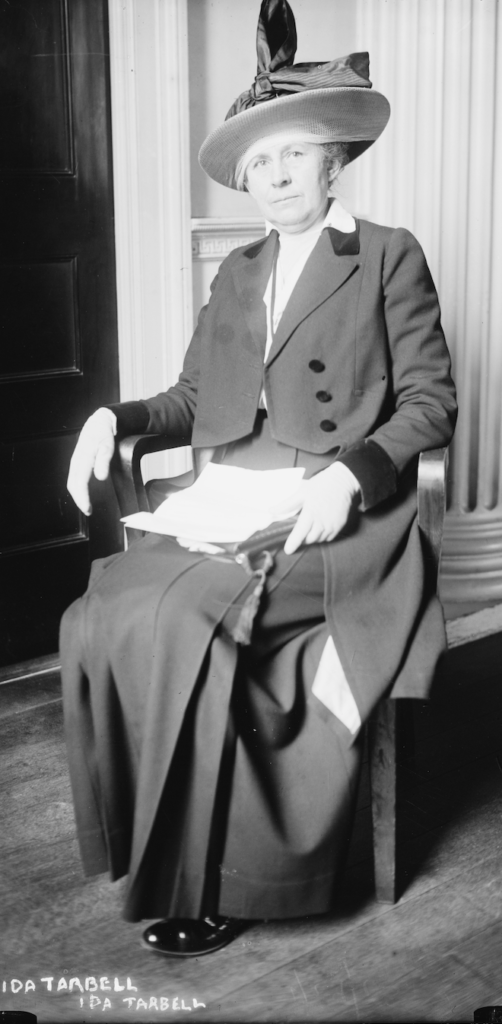By Karin Peterson
(c) Connecticut Explored Fall 2014
Subscribe/Buy the Issue!
Ida Tarbell, for nearly 40 years a resident of Easton, Connecticut, became the unlikely doyenne of the “muckrakers” of the progressive era. Her The History of the Standard Oil Company (McClure, Philips & Co., 1904), with its searing appraisal of the immoral practices used by John D. Rockefeller to build his monopoly, first appeared as a series in McClure’s Magazine and helped lead to federal anti-trust legislation. As a result of the public outrage and legal action engendered by Tarbell’s exposé, Standard Oil Company of New Jersey dissolved in 1911.
Tarbell, a former school-teacher and acclaimed Lincoln biographer, did not like being called a “muckraker,” an initially pejorative term coined by President Theodore Roosevelt to describe journalists who were bent on finding and exposing political corruption, industrial monopolies, and fraudulent business practices. She felt the label implied a one-sided emotional attack rather than an objective, balanced presentation of facts; she considered herself an investigative journalist. She felt that she and other writers such as Lincoln Steffens, Sinclair Lewis, Ray Stannard Baker, and Upton Sinclair took up their pens to focus on social ills out of moral concern and with the hope of affecting positive change.
Tarbell was born in 1857 in northwestern Pennsylvania, where her father was involved with the emerging oil industry. His business was one of many small enterprises that were negatively affected by the rise of large oil monopolies. Despite the family’s resulting financial setback, Tarbell was able to attend Allegheny College, graduating in 1880. After several years teaching school and then working at a monthly magazine, she went to Paris to do postgraduate work in history. To support herself she wrote magazine articles, some of which caught the attention of Samuel McClure, who invited her to write for his new publication. Her first major piece for McClure’s was a biography of Napoleon, which appeared as a series and was followed by a similar serial biography of Abraham Lincoln. These were so successful that they were published as books and established Tarbell’s reputation as a writer.
In recognition of her childhood experiences, Tarbell was assigned by McClure’s to write about the development of the Standard Oil Company. With an assistant, she spent two years tracking down documents and conducting extensive interviews. Henry H. Rogers, an official at Standard Oil, was very cooperative—not understanding her intent. Tarbell was able to piece together a compelling narrative of the secret deals and strong-arm tactics used by large companies to force out smaller competitors. The series, which began in November 1902 and continued for 19 issues, was the first corporate exposé of its kind. Circulation of the magazine soared, and Tarbell’s articles were published in two volumes in 1904.
This success brought Tarbell widespread recognition and financial gain. When her father died in 1905, Tarbell purchased a property in Easton, Connecticut. She named the simple white frame house “Twin Oaks,”
and it became a refuge from her busy professional life in New York City and home for her mother, sister, and other relatives. Tarbell used a first-floor room as her study and did most of her writing there.
Karin Peterson is museum director for the Department of Economic and Community Development.
 Connecticut Explored received support for this publication from the State Historic Preservation Office of the Department of Economic and Community Development with funds from the Community Investment Act of the State of Connecticut.
Connecticut Explored received support for this publication from the State Historic Preservation Office of the Department of Economic and Community Development with funds from the Community Investment Act of the State of Connecticut.
Explore!
Read all of our stories about Notable Connecticans on our TOPICS page
Return to Fall 2014: Power of the Pen

